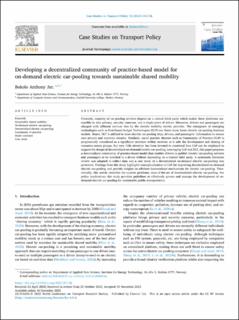Developing a decentralized community of practice-based model for on-demand electric car-pooling towards sustainable shared mobility
Peer reviewed, Journal article
Published version
Permanent lenke
https://hdl.handle.net/11250/3125074Utgivelsesdato
2023Metadata
Vis full innførselSamlinger
Originalversjon
Case Studies on Transport Policy. 2024, 15, Artikkel 101136. 10.1016/j.cstp.2023.101136Sammendrag
Presently, majority of car-pooling services depend on a central third party which makes these platforms susceptible to data privacy, security concerns, and a single point of failure. Moreover, drivers and passengers are charged with different services fees by the electric mobility service provider. The emergence of emerging technologies such as Distributed Ledger Technologies (DLT) can foster trust, boost electric car-pooling business models. Hence, DLT is utilized to store electric car-pooling trips, drivers, and passengers’ information to ensure user privacy and maintain security. Similarly, social practice theories such as Community of Practice (CoP) is progressively considered as a significant structure within societies as it aids the development and sharing of resources across groups. But very little attention has been devoted to examined how CoP can be employed to support the design of decentralized on-demand electric car-pooling. Leveraging CoP and DLT, this paper proposes a decentralized community of practice-based model that enables drivers to publish electric car-pooling services and passengers to be matched to a driver without depending on a trusted third party. A systematic literature review was adopted to collect data and a case study of a decentralized on-demand electric car-pooling was presented. Findings from this study highlights conceptualization of CoP for improving decentralized on-demand electric car-pooling and provide insights on efficient decentralized mechanisms for electric car-pooling. Theoretically, this article identifies the current problems, state-of-the-art of decentralized electric car-pooling. For policy implications this study provides guidelines to effectively govern and manage the development of ondemand electric car-pooling for sustainable public transportation.

